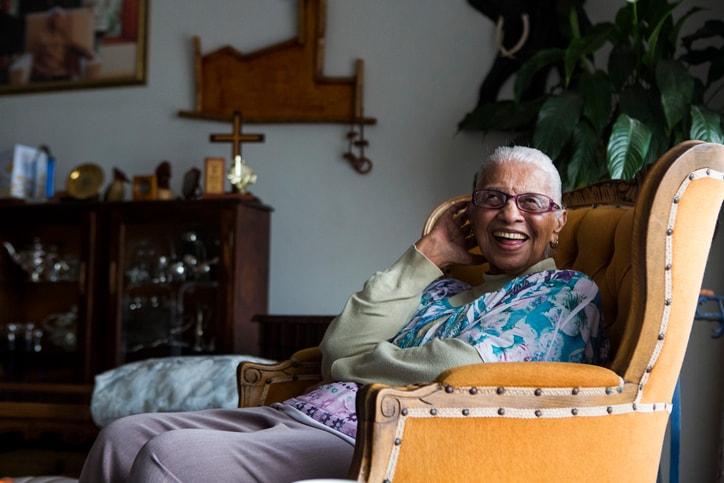In this article
- What is ambiguous loss?
- Why is dealing with ambiguous loss so difficult?
- What are some coping strategies for missing your loved one due to dementia?
- How to maintain connection while accepting change
- When it’s time to seek professional help
- Where to find support
- Moving forward with grace while managing ambiguous loss
If you’re caring for someone with dementia, you might find yourself grieving them even though they’re still alive. Maybe your mom no longer recognizes you when you visit. Perhaps your spouse can’t remember the inside jokes that once defined your relationship. Or your dad who was once a brilliant accountant can no longer make sense of numbers that used to be his entire world.
This paradox of mourning someone who’s still physically present has a name: ambiguous loss. “Ambiguous loss is the mental anguish in reaction to losing a person cognitively or psychologically but still physically present,” explains Niloufar Esmaeilpour, a registered clinical counselor and founder of a trauma and loss practice. “In dementia caregiving, this is especially profound because the loved one may still be present at the dinner table or still holding your hand, but their personality, memories and ability to relate may be altered or gone.”
Understanding this type of grief — and learning how to navigate it while continuing to provide care — can help you find moments of connection and peace, even as dementia changes your loved one.
Key takeaways
- Caring for someone with dementia often involves grieving a person who is still physically present but psychologically altered. This ongoing, unresolved grief — called ambiguous loss — creates emotional confusion, as caregivers navigate the tension between hope and heartbreak without the closure of traditional loss.
- Unlike typical grief, ambiguous loss lacks finality, often trapping caregivers in a cycle of guilt, exhaustion and role reversal. Recognizing the psychological weight of this kind of loss is essential, and giving yourself permission to grieve, even while your loved one is still alive, is a crucial part of healing.
- Although dementia changes the way loved ones engage, connection can still happen through presence, touch, music and simple rituals. By letting go of expectations and meeting your loved one in the “now,” caregivers can cultivate new forms of intimacy that honor both the past and the present.
- Caregivers are at heightened risk for burnout, depression and isolation, making professional support and peer connection vital. From therapy and support groups to caregiver-specific resources and podcasts, seeking help isn’t a sign of weakness — it’s an act of strength that benefits both you and your loved one.
What is ambiguous loss?
Ambiguous loss describes grief without closure. Unlike traditional loss, where death provides a definitive ending, ambiguous loss lives in an ongoing state of uncertainty. In dementia care, families often experience this loss in its most poignant form: their loved one is both here and not here.
From a medical perspective, this loss is very real. “Dementia refers to changes in cognition that are severe enough that they impact someone’s daily function,” says Eileen Whalen, nurse practitioner at UTHealth Houston Neurocognitive Disorders Center and Memorial Hermann. “Depending on the part of the brain affected, symptoms such as short-term memory loss, attention issues, impulse control, emotional dysregulation, impaired movement and others, can occur.”
As brain cells become damaged, lose function and die, the person you knew may seem to disappear — even though they’re sitting right across from you.
Sue Ryan, co-founder of the nonprofit The Caregiver’s Journey, experienced this firsthand when her husband Jack, a successful CFO who was “like a savant with numbers,” could no longer complete their tax return.
“I froze. My body temperature shot up. I knew something was seriously wrong,” she recalls. “Then, a floodgate of little hints that I had passed off as his being busy and distracted began to bombard me, and I knew in that instant he had dementia.”
Why is dealing with ambiguous loss so difficult?
Unlike conventional grief, with ambiguous loss, there’s no funeral, no final goodbye — no moment when you can move forward.
“Ambiguous loss does not follow the conventional stages of grief because there is no closure or finality,” Esmaeilpour explains. “Psychologically, caregivers are stuck in a cycle of hope and despair — they may feel guilty about grieving too soon or guilty about seeking relief. This ongoing uncertainty and role reversal creates a sense of disorientation and emotional exhaustion that makes the grieving process itself appear endless.”
Pam Ross, who cares for her mother, describes it this way: “My mom was my travel partner, my confidant, and the person who was always there to help me overcome my procrastinations. These days, I often reach for the phone to tell her about my day, or drive over thinking, ‘I’m going to see my mom’ — then remember she doesn’t really know me anymore. My brain tries to forget that in fleeting moments, so grief comes in waves every day.”
Whalen adds, “As someone’s cognition changes, relationship dynamics change too. Children feel more responsible for parents; spouses grieve the loss of a partner. This can be an emotional journey too.”
When caregiving for a loved one with dementia, you’re not just witnessing decline — you’re actively providing intimate care for a person who should feel familiar but may no longer recognize you, all while managing common dementia behaviors and processing your own loss.
What are some coping strategies for missing your loved one due to dementia?
While ambiguous loss can feel overwhelming, caregivers can find meaningful ways to cope with their grief while continuing to provide loving care.
Practice “massive acceptance and radical presence”
Ryan developed a framework that has helped her through multiple dementia caregiving journeys: “Massive acceptance is accepting exactly what is, 100%. We don’t have to like it. We don’t have to agree with it. We just have to accept this is exactly what it is, without judgment of ourselves, the situation or others. Radical presence is staying fully present in this moment. We’re not wishing it was the way it had been, and we’re not fortune-telling into the future.”
This approach allows caregivers to release expectations and meet their loved one exactly where they are, creating space for authentic connection rather than constant disappointment.
“Massive acceptance is accepting exactly what is, 100%. We don’t have to like it. We don’t have to agree with it. We just have to accept this is exactly what it is, without judgment of ourselves, the situation or others. Radical presence is staying fully present in this moment. We’re not wishing it was the way it had been, and we’re not fortune-telling into the future.”
— Sue Ryan, co-founder of a nonprofit for caregivers
Focus on preserved abilities and positive memories
Not everything is lost in dementia. “In my experience, most people tend to have an innate desire to be useful and helpful even in later stages of dementia,” Whalen says. “People with dementia often have longer-term memories preserved for a longer period of time. Favorite movies, music or reminiscing over old photographs can be useful tools.”
She suggests framing requests as invitations: “Can you help me with the dog today? We’d love your company on the walk” rather than commanding “You have to get off the couch and walk today.” This honors the person’s dignity while creating opportunities for engagement and independence.
Create new rituals and simple connections
As cognitive abilities change, connection becomes simpler but no less meaningful. Ross shares: “Being in the present is really all you have when someone doesn’t remember from one moment to the next. I spend time listening, holding my mom’s hand, entering her world.”
She and her sister created audio books for their mother and use technology to maintain connection. “These little nodes of connection keep us as close as we can be,” she says.
Esmaeilpour encourages families to develop “new rituals, such as listening to music together, looking at photographs, or simply engaging in some basic sensory activities together. This allows families to honor the relationship as it now stands.”
Let go of who they were
Perhaps the hardest step is releasing your attachment to the past.
“I meet my loved one exactly where they are in the moment,” Ryan says. “I connect with them where they are, don’t expect or ask them to be who they used to be, and live with them exactly where they are. I’m not filled with ‘what isn’t’ — I’m living with them in ‘what is.'”
This doesn’t mean forgetting who they were; it means creating space to accept and appreciate who they are now.
How to maintain connection while accepting change
Even as dementia progresses, meaningful connection is still possible. The key is shifting your expectations and finding new ways to be together.
“Even after cognitive ability declines, meaningful connections can still be established through touch, eye contact, music and routine rituals,” Esmaeilpour says. “These small but powerful moments of connection help caregivers feel that their love and care still matter, despite the changes dementia brings.”
When trying to calm a dementia patient or engage with them, Whalen suggests emphasizing “wanting to spend time together, provide reassurance and voice appreciation when the person engages in a new activity or routine. This helps create positive associations for everyone.”
Ross offers practical advice: “Don’t argue or correct — step into their reality with compassion. Savor tiny wins: a smile, a hug, hearing your name.”
Remember that connection doesn’t require conversation or recognition. Sometimes presence is enough.
“Even after cognitive ability declines, meaningful connections can still be established through touch, eye contact, music and routine rituals. These small but powerful moments of connection help caregivers feel that their love and care still matter, despite the changes dementia brings.”
— Niloufar Esmaeilpour, a registered clinical counselor
When it’s time to seek professional help
Grieving while caregiving takes an enormous toll. Research shows that caregivers face higher rates of depression, anxiety, chronic illness and even changes to their immune system.
“It’s only natural to feel sad, frustrated or even angry when living with ambiguous loss,” Esmaeilpour says. “But when these emotions become overwhelming and long-lasting, that’s the time to seek help from a professional.”
Warning signs you need support include:
- Persistent feelings of hopelessness or depression.
- Withdrawal from social activities and relationships.
- Inability to manage daily responsibilities.
- Emotional numbness that won’t lift.
- Irritability, anger or frustration toward your loved one.
- Neglecting your own health.
- Increased use of alcohol or substances.
- Thoughts of harming yourself or your loved one.
Ryan reached her breaking point during what she calls a “dementia moment” when her husband didn’t recognize her and became fearful and aggressive. “My kind, gentle, loving husband had been replaced by a large, strong man, filled with fear of me and where he was,” she recalls. That experience prompted her to seek professional support.
If you’re experiencing caregiver burnout, don’t wait for a crisis. Early intervention can make caregiving — and grieving — more manageable.
Where to find support
You don’t have to navigate ambiguous loss alone. Many organizations and resources exist specifically to support dementia caregivers.
Support groups
“Support groups are so useful as they give caregivers a space to process emotions with others who really understand the complexity of ambiguous loss,” Esmaeilpour says. “Learning from others can reduce guilt and provide practical suggestions for coping.”
Ryan agrees: “They are shared hugs, compassion, understanding. None of us feels the need to defend or justify who and where we are. They also help us not feel the isolation that sometimes comes with the increasing demands of our time.”
Ross found support through a caregiver art program offered by an organization called Rare Dementia Support, which helped her “reclaim my own well-being.”
Organizations and resources to explore
- Alzheimer’s Association: Offers a 24/7 helpline (800-272-3900), support groups, educational programs and a Community Resource Finder
- Family Caregiver Alliance: A national nonprofit that provides online support groups, caregiving guides, and state-by-state resources
- The Caregiver’s Journey: Nonprofit that offers podcasts and practical guides for dementia caregiving, including the newly released Navigating Dementia Caregiving Roadmap.
- Local adult day centers: Provide respite care and social activities for people with dementia
- Area agencies on aging: Connect you with local services and support
You might also check out podcasts on the topic of caring for an older loved one who has dementia, like The Caregiver’s Journey, which offers practical advice in a short, engaging format.
“Podcasts — the incredibly valuable, on-demand insights of others sharing their experiences and expertise — help us hear others articulate feelings we sometimes don’t know how to put into words, validating experiences that sometimes even our most loyal and loving friends and family may not understand,” points out Ryan.
Or consider working with a therapist who specializes in caregiver support or grief counseling. “A long-term therapist or counselor can help navigate the changes in relationship dynamics and strengthen coping skills,” Whalen suggests.
Ask your doctor for referrals, contact your insurance provider’s behavioral health line, or explore Psychology Today’s therapist directory to search for specialists in your area.
Moving forward with grace while managing ambiguous loss
Ambiguous loss in dementia caregiving is one of the most challenging emotional experiences you may face. The person you love is changing in fundamental ways, and you’re asked to grieve them while still showing up every day to provide care.
But within this profound loss, moments of connection and even joy are still possible. By practicing acceptance, staying present, honoring your grief and seeking support, you can navigate this journey with more grace and less isolation.
As Ryan beautifully puts it: “Through massive acceptance and radical presence, I let go. I accept fully and completely what my loved one no longer has access to. With massive acceptance and radical presence — and without judgment — I now journey as the observer, not the judge. I stay fully present in the moment, moment by moment.”
And Ross reminds caregivers: “Give yourself space to grieve each stage; as the saying goes, the only way out is through.”
Your loved one may not remember your name or your shared history, but your presence, your touch, and your care still matter. You’re honoring both who they were and who they are now — and that’s the most loving thing you can do.





